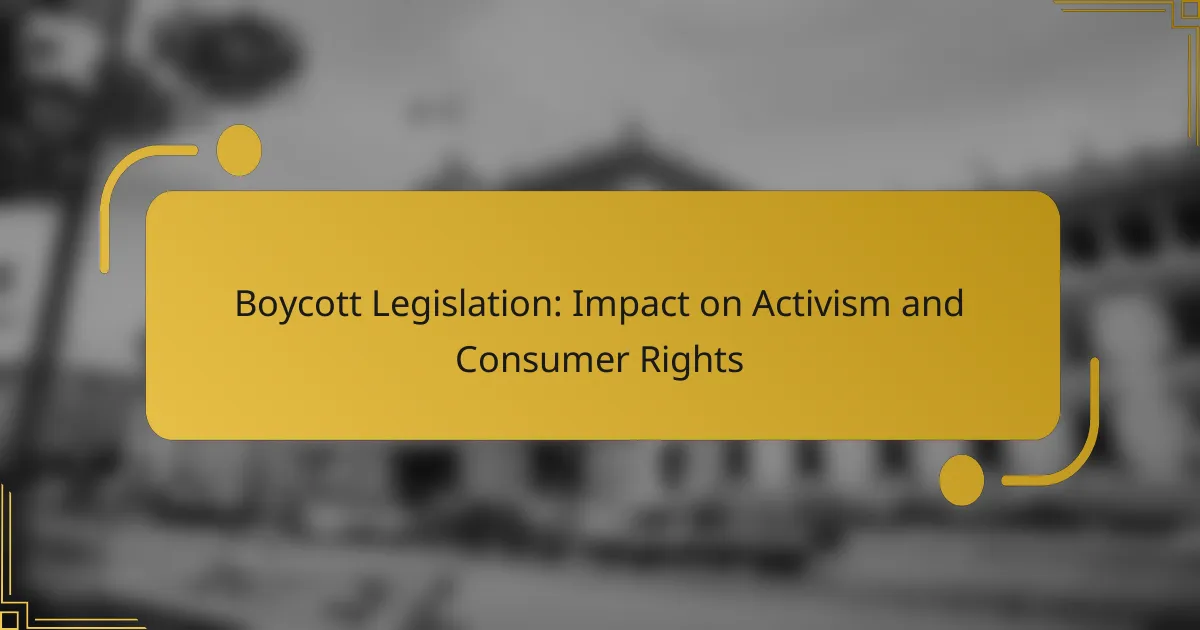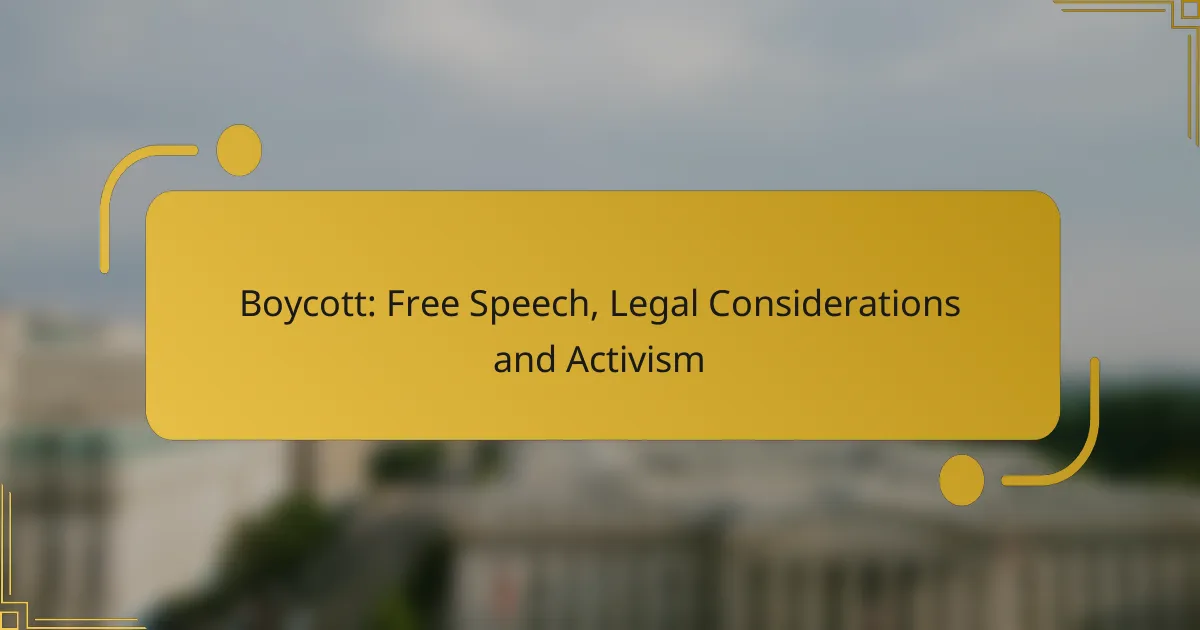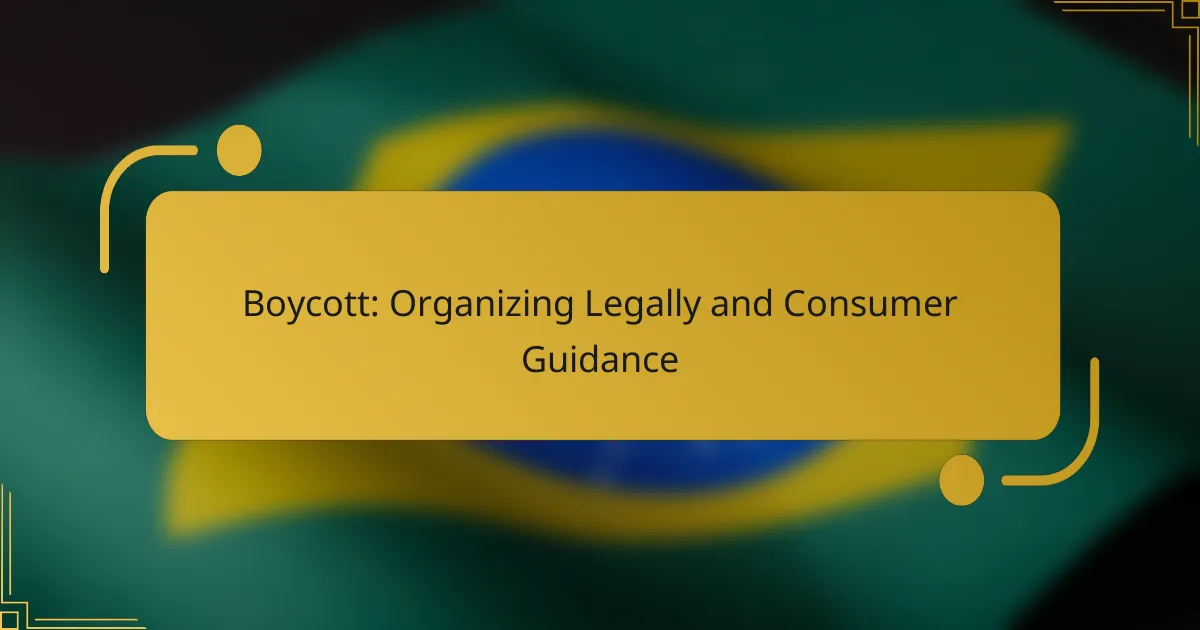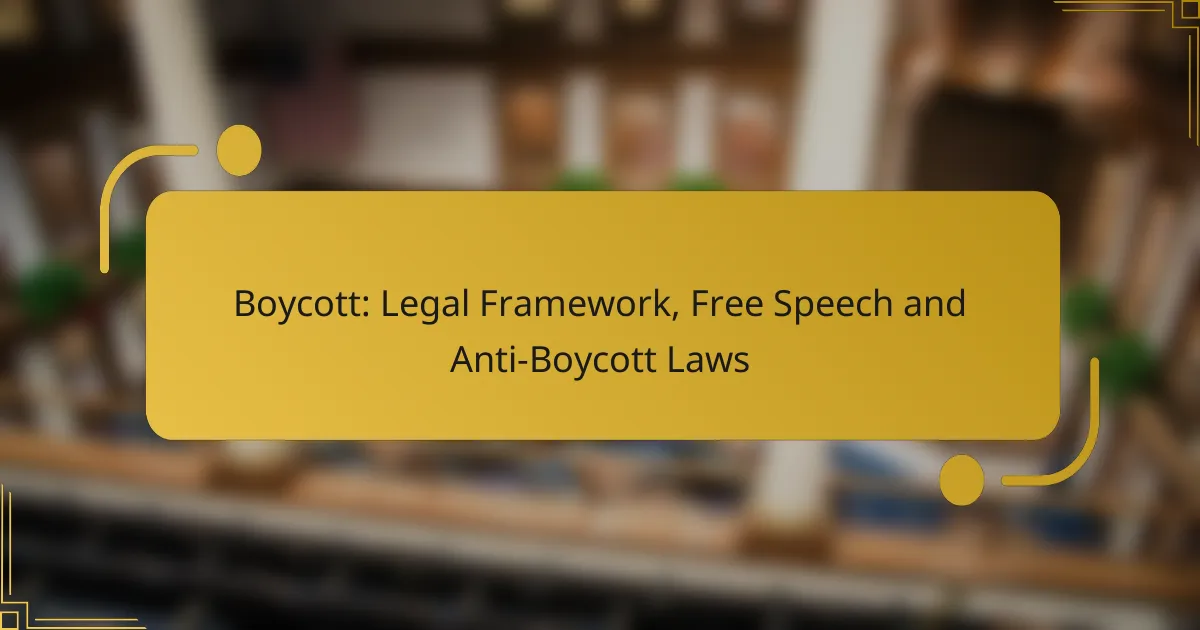Boycott legislation in the United States plays a crucial role in shaping consumer rights and activism by regulating how individuals and groups can organize against companies or governments. While these laws can empower grassroots movements, they also pose challenges to traditional advocacy methods, potentially limiting consumer expression and the ability to protest based on political or social issues.

How does boycott legislation affect consumer rights in the United States?
Boycott legislation in the United States can significantly impact consumer rights by regulating how individuals and groups can organize against companies or governments. These laws may restrict the ability to protest or withdraw support based on political or social issues, which can limit consumer expression and activism.
Increased protections for consumers
Some boycott legislation aims to protect consumers by ensuring that their rights to free speech and assembly are upheld. This can empower individuals to express their opinions about corporate practices without fear of retaliation or legal consequences. For instance, laws may prevent companies from penalizing consumers who choose to boycott based on ethical concerns.
Additionally, these protections can foster a more transparent marketplace where consumers are informed about the practices of companies they support or oppose. This transparency can lead to more ethical consumer choices and encourage businesses to adopt socially responsible practices.
Limitations on corporate influence
Boycott legislation can also limit corporate influence over consumer behavior by creating a framework where consumers can collectively voice their dissent. By enabling organized boycotts, these laws help to balance power dynamics between large corporations and individual consumers. This can lead to more equitable treatment of consumers in the marketplace.
However, some argue that overly restrictive boycott laws may inadvertently empower corporations by shielding them from public scrutiny. It is essential for consumers to remain aware of their rights and advocate for legislation that supports their ability to protest corporate actions effectively.

What are the key impacts of boycott legislation on activism?
Boycott legislation significantly influences activism by shaping how individuals and organizations mobilize against perceived injustices. These laws can empower grassroots movements while simultaneously presenting challenges to traditional advocacy methods.
Empowerment of grassroots movements
Boycott legislation can energize grassroots movements by providing a clear framework for collective action. Activists often leverage these laws to rally support and encourage consumer participation, creating a sense of unity and purpose among supporters.
For instance, when a community organizes a boycott against a company for unethical practices, the legal backing can enhance the movement’s visibility and legitimacy. This can lead to increased media attention and public engagement, amplifying the activists’ message.
Challenges to traditional advocacy
While boycott legislation can empower activists, it also poses challenges to traditional advocacy strategies. Organizations that rely on lobbying and negotiation may find their efforts undermined by the legal constraints imposed on boycotts, limiting their ability to influence policy effectively.
Additionally, the potential for backlash against boycotts can deter some consumers from participating, fearing repercussions. Activists must navigate these complexities, balancing the benefits of mobilization with the risks of alienating potential allies or facing legal consequences.
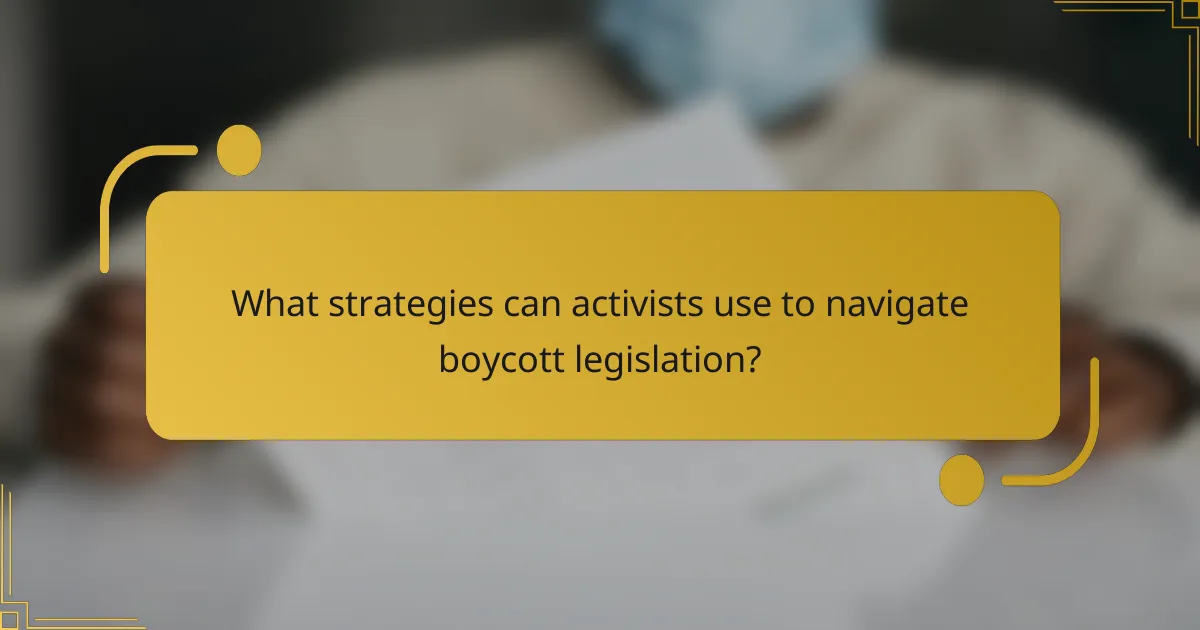
What strategies can activists use to navigate boycott legislation?
Activists can effectively navigate boycott legislation by employing targeted strategies that focus on public engagement and collaboration. These approaches help maintain momentum for social causes while adhering to legal constraints.
Leveraging social media campaigns
Social media platforms are powerful tools for activists to raise awareness and mobilize support. By creating engaging content that highlights the impact of a boycott, activists can reach a broad audience quickly. Utilizing hashtags, videos, and infographics can enhance visibility and encourage sharing.
It’s crucial to tailor messages to resonate with specific demographics, ensuring that the campaign speaks directly to the values and concerns of potential supporters. Regular updates and interactive elements, such as polls or Q&A sessions, can further engage followers and maintain interest.
Building coalitions with other organizations
Forming coalitions with like-minded organizations amplifies the impact of activism. By pooling resources and expertise, groups can create a unified front that is more difficult for opposing forces to ignore. Collaborations can also lead to shared campaigns that broaden outreach.
When building coalitions, it’s essential to establish clear goals and communication channels. Regular meetings and joint strategy sessions can help maintain alignment and address any challenges that arise. Additionally, leveraging each organization’s strengths can enhance the overall effectiveness of the coalition’s efforts.
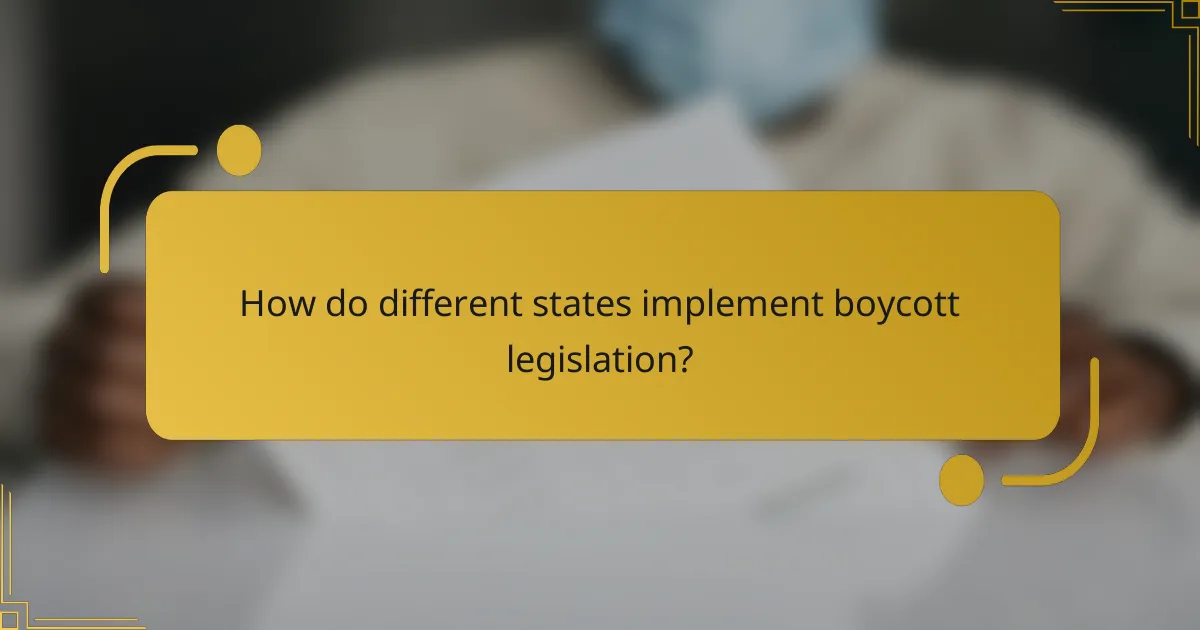
How do different states implement boycott legislation?
States implement boycott legislation in various ways, often reflecting local political climates and social issues. These laws can restrict state contracts with entities that engage in boycotts against certain countries or industries, impacting both activism and consumer rights.
Variations in state laws
Boycott legislation varies significantly across states, with some states enacting strict laws while others take a more lenient approach. For example, states like Florida and Texas have comprehensive laws that penalize companies participating in boycotts against Israel, while other states may have no such restrictions.
Additionally, the enforcement of these laws can differ, with some states requiring companies to certify compliance with boycott regulations before entering contracts. This creates a patchwork of regulations that can complicate compliance for businesses operating in multiple states.
Case studies from California and Texas
In Texas, the boycott legislation is particularly stringent, prohibiting state contracts with companies that boycott Israel. This law has led to significant legal challenges and discussions about free speech, as companies navigate the implications of compliance versus activism.
Conversely, California has adopted a more nuanced stance, focusing on consumer rights and allowing for boycotts as a form of protest. This difference illustrates how local values shape the implementation of boycott laws, affecting both consumers and businesses in these states.
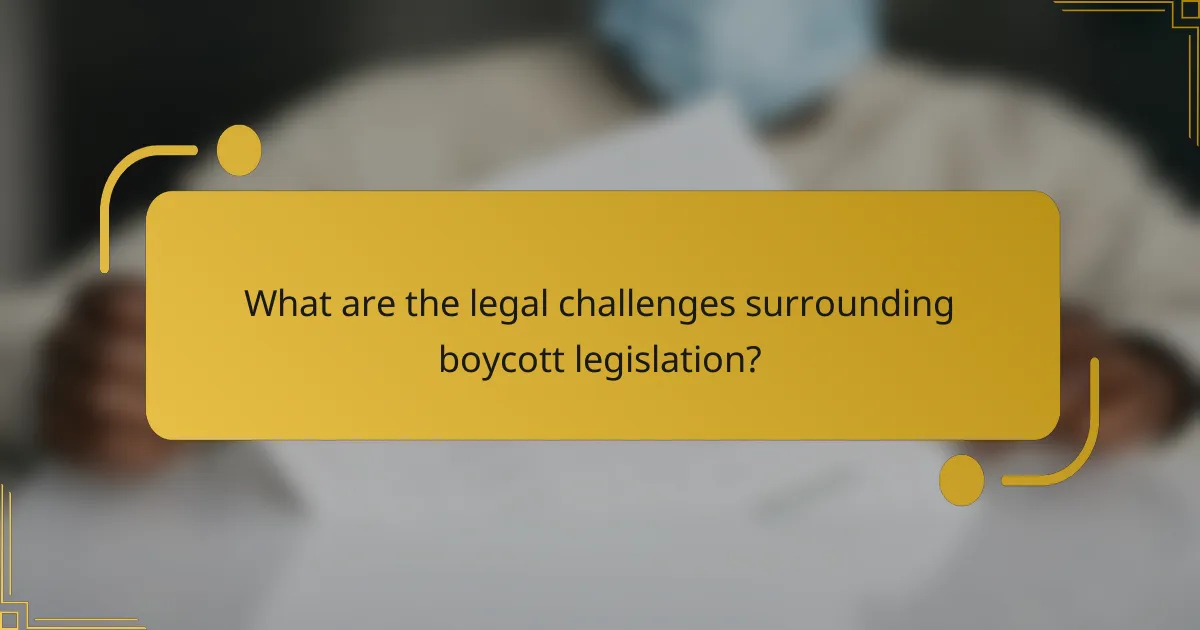
What are the legal challenges surrounding boycott legislation?
Boycott legislation often faces legal challenges primarily related to free speech and consumer rights. These laws can restrict individuals and organizations from participating in boycotts, raising concerns about their constitutionality and the implications for activism.
First Amendment implications
The First Amendment protects freedom of speech, which includes the right to engage in boycotts as a form of political expression. Legal challenges often argue that laws restricting boycotts infringe upon this fundamental right, leading to court cases that assess the balance between state interests and individual freedoms.
In some instances, courts have ruled that boycotts are a legitimate form of protest, reinforcing the notion that individuals should be able to express dissent through economic means. This has led to a complex legal landscape where the scope of First Amendment protections is continually tested against state legislation.
Litigation examples and outcomes
Several notable cases have emerged regarding boycott legislation, showcasing varying outcomes. For example, in 2018, a federal court ruled against a state law that penalized companies for participating in boycotts against Israel, citing First Amendment violations.
Other cases have resulted in mixed outcomes, where courts upheld certain restrictions while striking down others. These legal battles highlight the ongoing tension between state regulations and constitutional rights, making it crucial for activists and consumers to stay informed about the evolving legal context surrounding boycott legislation.
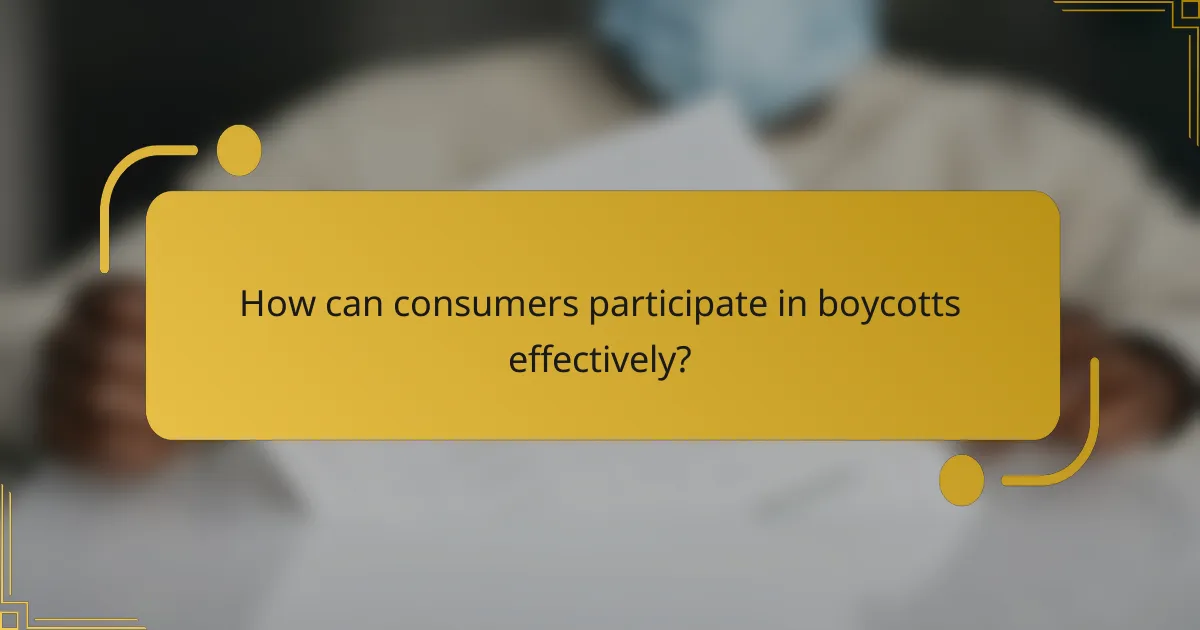
How can consumers participate in boycotts effectively?
Consumers can participate in boycotts effectively by choosing specific companies to target and understanding the potential impact of their purchasing decisions. Engaging in organized efforts, staying informed, and communicating with others can amplify the effectiveness of a boycott.
Identifying target companies
To identify target companies for a boycott, consumers should research businesses that engage in practices contrary to their values, such as unethical labor practices or environmental harm. Look for companies that have faced public backlash or negative press regarding their actions.
Creating a list of companies that align with your boycott goals can help streamline efforts. Consider using social media or community forums to share information and gather insights from others who may have similar concerns.
Understanding the impact of consumer choices
Consumer choices can significantly impact a company’s bottom line, especially when a large number of individuals participate in a boycott. Studies suggest that coordinated boycotts can lead to revenue declines of 10-20% for targeted companies, depending on the scale and duration of the effort.
It’s essential to communicate the reasons behind the boycott clearly to encourage others to join. Sharing personal stories or data can help illustrate the importance of the cause and motivate collective action.

What are the emerging trends in boycott legislation?
Emerging trends in boycott legislation indicate a growing focus on regulating the ability of individuals and organizations to participate in boycotts. These trends often reflect political, social, and economic pressures, leading to new laws that can impact activism and consumer rights.
Increased corporate accountability
Increased corporate accountability is a significant trend in boycott legislation, as companies face mounting pressure to respond to consumer activism. Laws are being enacted that require businesses to disclose their political contributions and lobbying efforts, which can influence public perception and consumer choices.
For example, some states in the U.S. have introduced legislation that penalizes companies for engaging in boycotts against certain industries, such as fossil fuels or Israel. This creates a complex landscape where businesses must navigate between consumer expectations and legal constraints.
To effectively hold corporations accountable, consumers should stay informed about the companies they support and their positions on social issues. Engaging in discussions and sharing information can amplify the impact of consumer activism.
